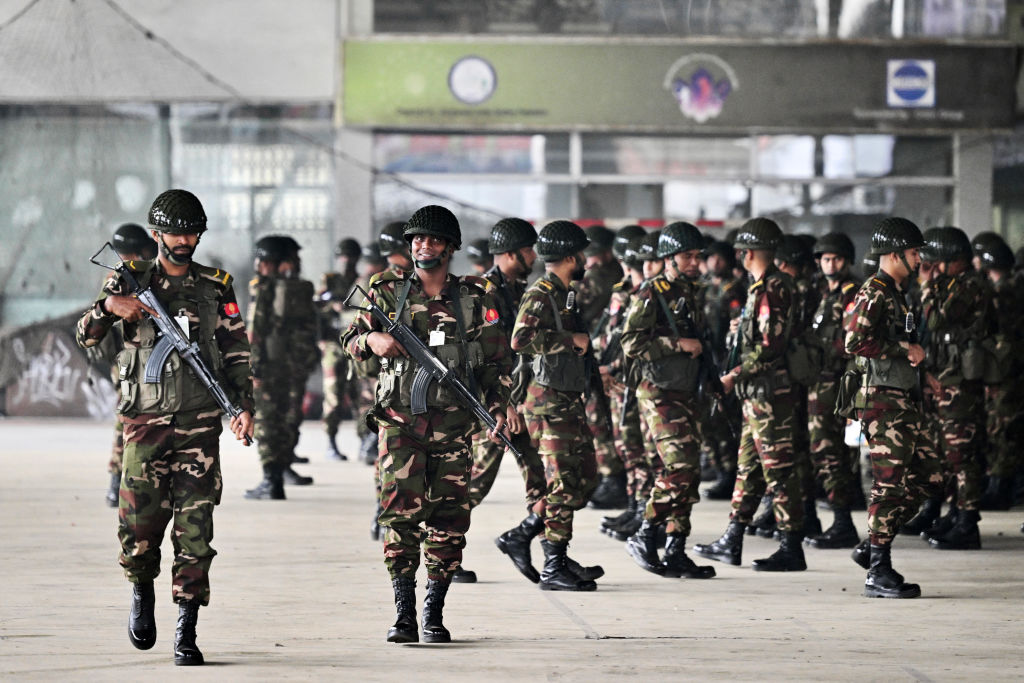- Sunday, April 20, 2025
Members of the Coast Guard, Border Guard Bangladesh and Rapid Action Battalion will also be on election duty.

By: Shubham Ghosh
AUTHORITIES in Bangladesh on Wednesday (3) deployed the armed forces to assist the administration in holding the January 7 national election in a free, fair, and peaceful manner as tensions spiked in the country ahead of the polls being boycotted by Bangladesh Nationalist Party (BNP), the country’s main opposition party.
“Members of the armed forces will be stationed at nodal points and other places in every district, sub-district, and metropolitan area,” said a statement of the Inter-Service Public Relations, the media wing of the Bangladeshi military.
Army personnel were deployed in several districts of the country on Tuesday (2), but they began work in capital Dhaka from 8 am local time on Wednesday.
Read: Interview on Bangladesh national election
They will help both the Election Commission and the local administration to ensure peace and discipline from January 3 to 10.
Apart from the armed forces, members of the Coast Guard, Border Guard Bangladesh (BGB) and Rapid Action Battalion (RAB) will also be on election duty.
The Bangladesh Navy will operate in 19 districts, including Bhola and Barguna, while the Border Guard Bangladesh will take on the sole responsibility in 45 bordering upazilas.
The BGB and Army will work in 47 bordering upazilas and coordinate with the Coast Guard in four coastal upazilas, the ISPR said. The Bangladesh Air Force will provide helicopter support to the polling centres in the Hill Tracts region in the south-eastern part of the country. They have already prepared enough of them to meet the needs of the election.
The Armed Forces Division has formed a combined cell, including law enforcers and representatives from different ministries, which will be active until January 10.
The January 7 polls are being boycotted by the main opposition, BNP, led by former prime minister Khalida Zia, as its demand for an interim non-party neutral government to organise the voting was rejected by the government headed by prime minister Sheikh Hasina.
The BNP boycotted the 2014 election but took part in the 2018 polls, which party leaders later said was a mistake, alleging that the voting was marred with widespread rigging and intimidation.
Meanwhile, the BNP and its allies were criticised by ruling Awami League’s general secretary Obaidul Quader on Tuesday, who said that the January 7 polls will be participatory, the Dhaka Tribune newspaper reported. Calling the BNP’s leaflet distribution mysterious, Quader, also the road transport and bridges minister, said that the activists of the main opposition party might carry out an attack anytime.
“But they will not be able to thwart the election no matter how hard they try,” he was quoted as saying in the report.
On Monday, Hasina said the BNP is boycotting the general election because they found no scope to rig the polls. Claiming that the BNP had tried to foil the 2014 parliamentary election through violence but failed, Hasina said, “Now they are out to thwart the 12th parliamentary election slated for January 7 for which they are once again burning people to death through arson violence and subversive acts.”
The BNP has also called for civil disobedience against the Hasina-led dispensation, urging people not to pay taxes and utility bills to press its demand for a non-party interim government for election oversight by amending the country’s Constitution. It is also carrying out an anti-election street campaign, calling for intermittent strikes and transport blockades, saying no election under the incumbent government led by Hasina would be fair or neutral.
According to a media tally, 11 people died, 386 vehicles were torched, and four trains were derailed from tracks in the past two months in political violence.
The US and other major Western countries called for dialogue between the ruling Awami League and particularly with the BNP to ensure an inclusive and credible election, which, however, saw no headway due to reluctance from both sides.
With the BNP boycotting the election and no other credible opposition party against it, Hasina’s Awami League is likely to gain the upper hand and will likely form the government for the fourth consecutive term.
(With PTI inputs)